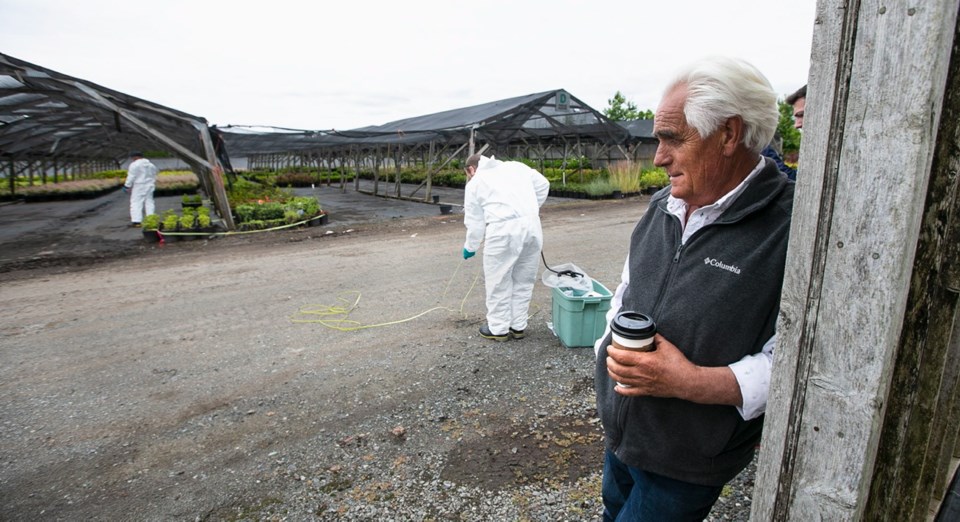A Central Saanich family fears its plant nursery will be forced to shut down if millions of dollars worth of plants are ordered destroyed after inspectors found spores from a pathogen on a rhododendron.
Island View Nursery has been placed under an initial two-week quarantine as Canadian Food Inspection Agency officials in protective gear carry out more tests this week to learn if the pathogen has spread.
“It is a nightmare,” family representative Alexandria Garcia said Wednesday.
Garcia argues that the federal government’s protocols for dealing with Phytophthora ramorum, a fungus-like pathogen that can cause disease in plants, are too harsh. Protocols — which include burning plants — are “very, very severe” and “disproportionate to the risk,” she said.
The Garcia family’s 80-acre nursery at 2933 McIntyre Rd. holds 100,000 plants, including 20 acres of trees, some more than 20 feet tall.
The largest wholesale nursery in the capital region, with up to 1,000 varieties, Island View has 10 employees and 30 greenhouses, plus a shaded area, Garcia said.
The nursery sells to close to 2,000 customers, including municipalities, garden centres and landscapers. Island View does not propagate plants but purchases them in B.C. only, she said.
Infrastructure and equipment on the site are also worth millions of dollars, Garcia said.
It’s the second time the pathogen has been found in the family’s nursery. When it happened in 2007-2008, everything had to be burned. At that time, compensation was available from the federal government, but even so, the business lost $1 million, Garcia said.
Today, the compensation program is gone and insurance is not available, she said.
If an extended quarantine is imposed and the plants are ordered destroyed, it will kill the business, she said. Plants will have to be burned.
She said her father is “in mourning” over the situation.
John Garcia, 61, arrived in Canada from Portugal at age 14, and began working with plants at Barker Landscaping Ltd., which he purchased as a young man. He fulfilled his dream of owning a nursery in 2004 with the purchase of the current site. His wife, Rosemary, worked on the accounts. Today, their children Alexandria, 25, and brother John, 24, work in the business.
Her father worked 12 to 14 hours per day, six to seven days a week for years to make his business a success, Garcia said.
Karen Watson, co-owner of Grow With Us Garden Supply in Sooke, is shocked at the nursery’s potential fate. “We have very much appreciated their being there and the selection they had and the service that they gave.”
Inspectors took samples last month, sending them to a laboratory for analysis. The family said they were notified via email Tuesday that spores were found on one plant and that the initial two-week quarantine is in effect.
Federal inspectors returned Wednesday to carry out followup testing on plants, soil, growing media and water.
In an email, the inspection agency described Phytophthora ramorum as a “harmful pathogen that can cause mortality in several oak tree species and also causes twig and foliar diseases in numerous native and non-native ornamental plants, shrubs, and trees.
“Planting infected host plants may serve as a pathway for the survival, establishment and spread of P. ramorum into susceptible host populations in the natural environment.”
Because spores are carried by air, Garcia said she expects more will be found, which would result in a minimum 90-day quarantine.
In that case, the nursery will have to keep all plants on site, comply with orders to dispose of infected plants and materials, and carry out biosecurity measures to stop any spread, the inspection agency said.
It said it targets southwestern B.C. for inspections because the climate poses the greatest risk of P. ramorum spreading. “This find is part of an ongoing inspection and surveillance program that is continuing through the year.”
Saanich-Gulf Islands MP Elizabeth May, leader of the Green Party of Canada, said in an interview from Yellowknife that the protocols for dealing with Phytophthora ramorum “appear excessive.”
Last year, May contacted the federal ministers for health, and agriculture and food calling for a review of protocols to ensure “more targeted and reasonable measures” are applied in such cases. She also recommended that a discontinued compensation program be reinstated.



